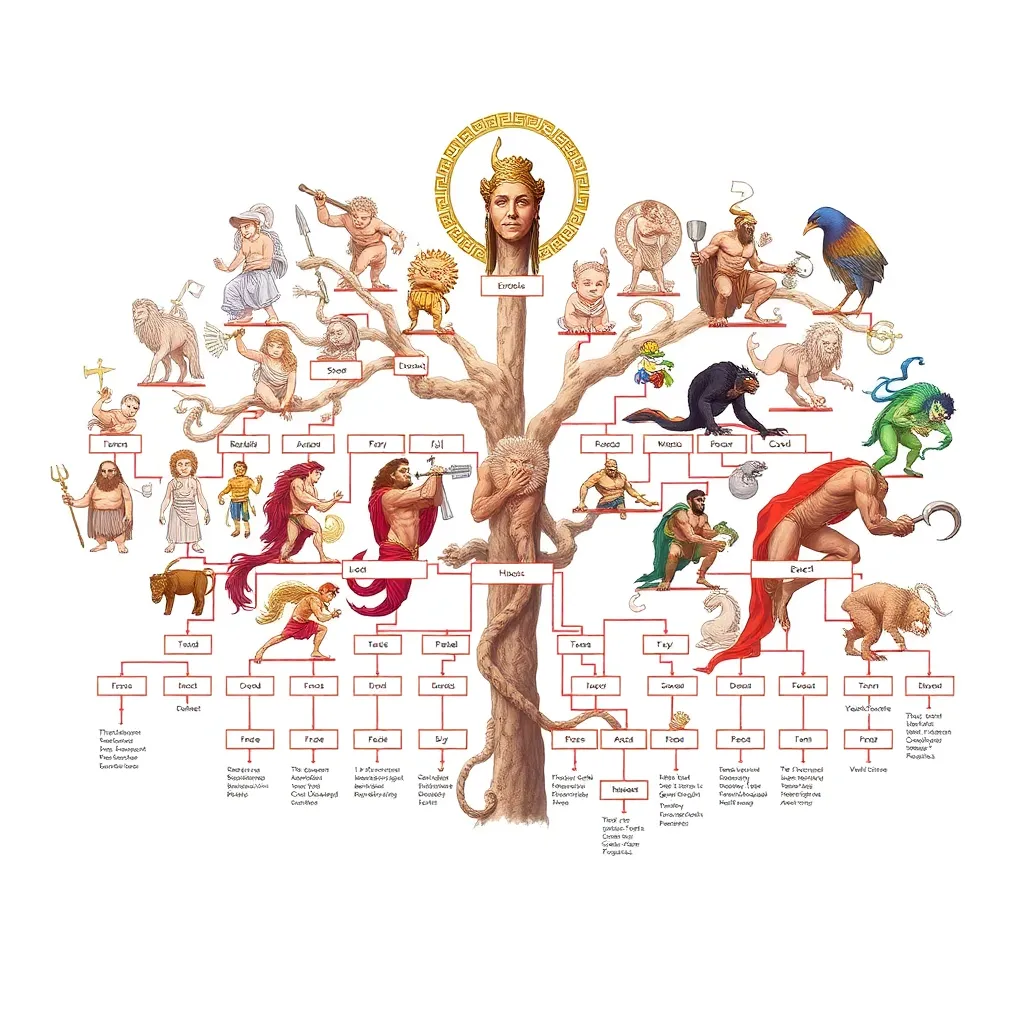The Family Tree of Perseus: Gods, Heroes, and Monsters
I. Introduction
Perseus stands as one of the most celebrated heroes in Greek mythology, renowned for his daring adventures and formidable lineage. His story intertwines with the destinies of gods, monsters, and other legendary figures, painting a vivid picture of the ancient world.
In Greek mythology, family lineage often plays a pivotal role, influencing the fate of characters through prophecies, divine interventions, and inherent traits. Understanding the family tree of Perseus not only sheds light on his identity but also reveals the complex relationships that shaped his legendary status.
This article aims to explore the intricate family connections of Perseus, delving into the roles of his divine parents, the impact of his grandparents, and the legacy he left behind.
II. The Divine Parentage of Perseus
A. Zeus: The Father of Perseus
Zeus, the king of the gods, occupies a central position in Greek mythology. He is the god of the sky, lightning, and thunder, wielding immense power and authority over both mortals and immortals.
The tale of Perseus begins with the extraordinary union between Zeus and Danaë, a mortal woman. According to legend, Zeus visited Danaë in the form of a golden shower, an act that led to her conception of Perseus. This divine intervention underscores the recurring theme of gods mingling with mortals, often resulting in extraordinary offspring.
B. Danaë: The Mortal Mother
Danaë, the daughter of King Acrisius of Argos, holds a significant place in the mythology surrounding Perseus. Her beauty and virtue caught the eye of Zeus, leading to their fateful encounter. Imprisoned by her father due to a prophecy that her son would kill him, Danaë’s life was forever altered by the arrival of Zeus.
Her lineage is noteworthy, as she descends from the royal family of Argos, connecting Perseus to a rich heritage, which becomes instrumental in his adventures.
III. The Grandparents: Acrisius and Acrisius’ Wife
A. Acrisius: The King of Argos
Acrisius, the king of Argos, is a tragic figure in Perseus’ family tree. His life was overshadowed by a prophecy that foretold his death at the hands of his grandson. This ominous prediction drove him to imprison Danaë in a bronze chamber, hoping to thwart fate.
Acrisius’ fear of the prophecy ultimately led to his demise. When Perseus grew up and learned of his lineage, he unwittingly fulfilled the prophecy by killing Acrisius during a discus throw at an athletic competition.
B. Acrisius’ Wife: A Minor but Significant Figure
Acrisius’ wife, though not a primary character in the myths, plays a crucial role in the narrative. Her identity often remains overshadowed by the actions of her husband and daughter. However, she represents the typical fate of women in Greek mythology, often caught in the struggles and tragedies of their male relatives.
Her influence, albeit subtle, contributes to the unfolding of events that shape Perseus’ destiny.
IV. The Siblings and Extended Family of Perseus
A. The Unborn Siblings: Fate of Acrisius’ Line
While Perseus is the most notable offspring of Danaë, the fate of his unborn siblings represents the tragic consequences of Acrisius’ fear. Danaë’s imprisonment prevented any chance of siblings, sealing the fate of Acrisius’ lineage.
B. Extended Family Connections
- Perseus is connected to other heroes and demigods, such as Hercules, through shared ancestral lines.
- His family ties influence his adventures, as he encounters various figures linked to his lineage throughout his quests.
V. The Monsters of Perseus’ Mythology
A. Medusa: The Gorgon
One of the most famous monsters in Greek mythology, Medusa was originally a beautiful maiden transformed into a Gorgon as punishment by Athena. Her hair became a mass of snakes, and her gaze could turn anyone to stone.
Perseus’ quest to slay Medusa is a defining moment in his story. Armed with gifts from the gods, including a reflective shield from Athena, he successfully beheaded her, showcasing both his bravery and the support of divine powers.
B. Other Monsters Encountered
The sea monster Cetus also plays a significant role in Perseus’ adventures. Sent to devour Andromeda as punishment for her mother’s hubris, Cetus is defeated by Perseus, further establishing him as a hero of immense strength and valor.
Monsters in Greek mythology often symbolize chaos and the struggles heroes must overcome to achieve greatness. Perseus’ encounters with these creatures highlight his heroism and the trials faced by demigods.
VI. The Legacy of Perseus: Children and Their Impact
A. Andromeda: The Heroine and Wife
Perseus’ marriage to Andromeda, a princess saved from Cetus, represents a union of strength and beauty. Their love story is significant, reflecting themes of heroism and redemption.
Together, they had several children, including Perses, who would later become associated with the Persian people, showcasing the far-reaching legacy of their lineage.
B. The Descendants of Perseus
The descendants of Perseus continued to make their mark in Greek mythology, with various characters contributing to the tapestry of myths. Some of his offspring, like Heracles (Hercules), became legendary heroes in their own right, furthering the family legacy of bravery and strength.
VII. The Influence of Perseus in Later Cultures
A. Perseus in Art and Literature
The tales of Perseus have inspired countless works of art and literature throughout history. From ancient Greek pottery depicting his battles with monsters to modern films and novels, his story resonates across cultures and eras.
Many artists have captured the dramatic moments of Perseus’ life, illustrating his triumphs and struggles in vivid detail.
B. The Symbolism of Perseus’ Family Tree
The family tree of Perseus symbolizes the intricate relationships between gods, heroes, and mortals. Themes of destiny, bravery, and the interplay of divine influence are woven throughout his narrative, reflecting the complexities of human experience.
In essence, Perseus serves as a reminder of the enduring nature of myth, where stories of gods and heroes continue to inspire and educate across generations.




